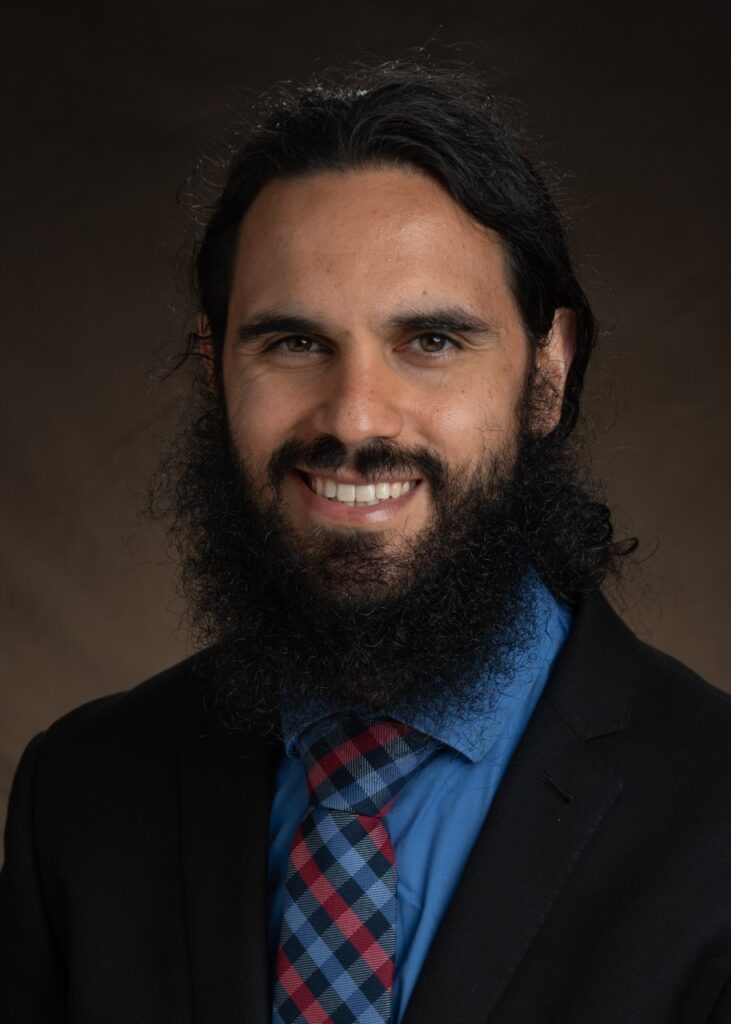Technological breakthroughs like artificial intelligence (AI) and large language models (LLM) are rapidly defining the modern era, with the potential to affect almost every scholarly field.
“The future holds immense promise and opportunity,” says Dr. James L. Caton, a long-time IHS faculty partner, addressing the advancement of technologies across and beyond the academy. “AI has been an ever-evolving field,” Caton said. “It’s a testament to human innovation. But technology that evolves at such a pace is challenging, and the transformative potential of AI has a lot of potential for destruction. But by the same token, we all have access to these large language models; and if somebody’s using them to hack, others can use them to help fight against hacking.”
Reinforced by his diverse academic background in economics and computation, Caton’s current research interests include blockchain and large language models like ChatGPT. Through his research, Caton is exploring the complexities of AI’s evolution.
“AI has been an ever-evolving field. It’s a testament to human innovation. But technology that evolves at such a pace is challenging, and the transformative potential of AI has a lot of potential for destruction. But by the same token, we all have access to these large language models; and if somebody’s using them to hack, others can use them to help fight against hacking.”
Dr. James L. Caton
Dr. Caton’s research and insights provide us with a tentative course for navigating the “AI revolution.” In 2020, the Institute for Humane Studies hosted Dr. Caton for an academic discussion colloquium and reading group on artificial intelligence and liberal futurism. It was here Dr. Caton first began to look at AI as not just a technological advancement, but something that could permeate society today and affect the future of liberty.
“Before being involved with the reading group, I had been inclined to think about AI in terms of academic and technical applications, without giving thought to its influence on privacy and governance,” Dr. Caton said. “This was a great opportunity to think about the application of technical knowledge that I had developed in the academy.”
His ever-evolving look at AI and its advancement continued to develop over the next few years, taking center stage when Dr. Caton was the discussion leader at an IHS Advanced Topics in Liberty discussion colloquium on tech ethics.

Dr. Caton continues to foster ethical discussions in the tech realm and showcases his dedication in adapting to these advancements in technology. “It’s not about solving all the problems 100 years ahead of time,” Caton says, “but about working on tomorrow’s problems today.” His continued partnership with IHS is a testament to his commitment to advancing liberty through the presentation of knowledge, research, and open discourse among a diverse group of scholars, and serves as a roadmap for the next generation seeking freedom-based solutions and empowerment within technical advancements.
“It’s not about solving all the problems 100 years ahead of time, but about working on tomorrow’s problems today.”
Dr. James L. Caton
Today, Dr. Caton is a scholar at the Challey Institute for Global Innovation and Growth with the Center for the Study of Public Choice and Private Enterprise and an assistant professor of economics in the Department of Agribusiness and Applied Economics at North Dakota State University. With distinguished background, Dr. Caton also serves as a mentor for the next generation of scholars.
While AI is still in early stages of integration, Dr. Caton continues to set an example for his students, slowly incorporating AI technologies into his own research to allow him to do his best work. By utilizing AI tools as a “virtual assistant,” Dr. Caton can expedite processes in data input, programming, and additional facets of his work. Through mentorship, he encourages his students to incorporate AI in their current research and to embrace advancing technologies in order to stay competitive in a rapidly changing job market across academic disciplines.
“I’m always keeping an eye on developments,” Dr. Caton says of new technologies. “If you’re an academic, an entrepreneur, you need to keep pace with how AI will be helpful to you, to your organization. There’s no going to sleep on this because we live in a competitive world.”
Behind these exciting developments is the specter of AI’s destructive potential. While these technological advancements push the envelope, Dr. Caton acknowledges the potential for the extensive development of AI and envisions a world where these technologies can be fully integrated into realms of liberty in society, such as privacy, governance, and security. From social media platforms to the military-industrial complex, and even in our legal system, Caton envisions AI becoming integrated with nearly every aspect of our society. Wherever technology is being used, it can be optimized.
“The future holds immense promise and opportunity,” Dr. Caton emphasized. “Technology that evolves at such a pace is challenging, and the transformative potential of AI has a lot of potential for destruction. But by the same token, we all have access to these large language models, and if somebody’s using them to hack, others can use them to help fight against hacking.”
IHS is proud to continue to support scholars like Dr. Caton and their pursuit of addressing tomorrow’s problems today and finding empowerment in the face of the rapid technological advancements. Learn more and discover how you can help support this community of scholars by visiting TheIHS.org.